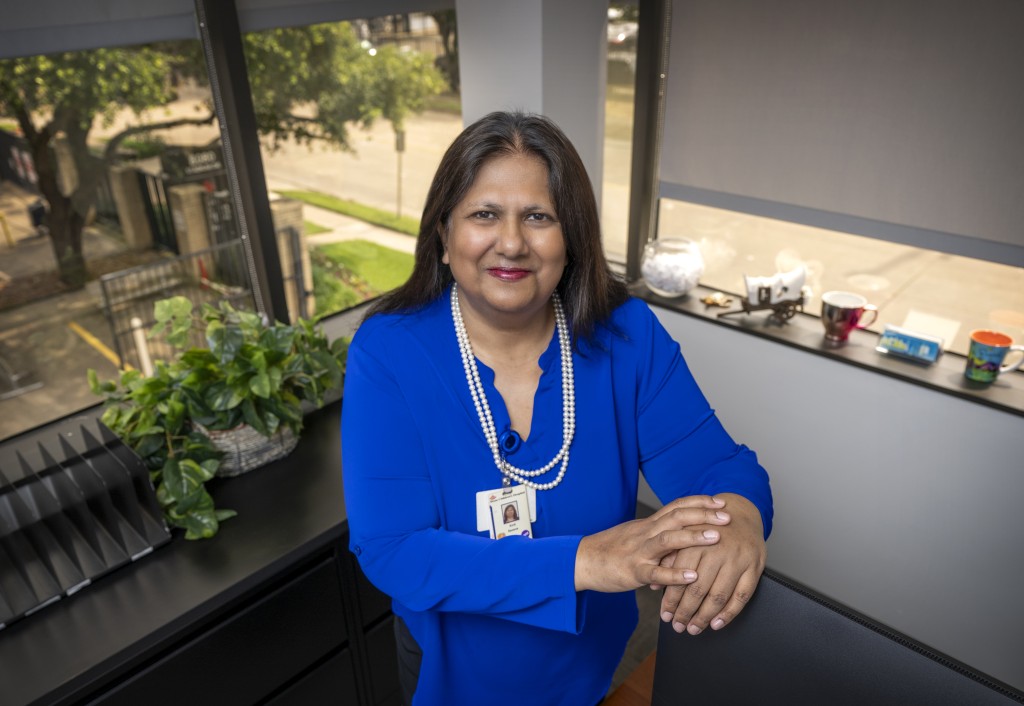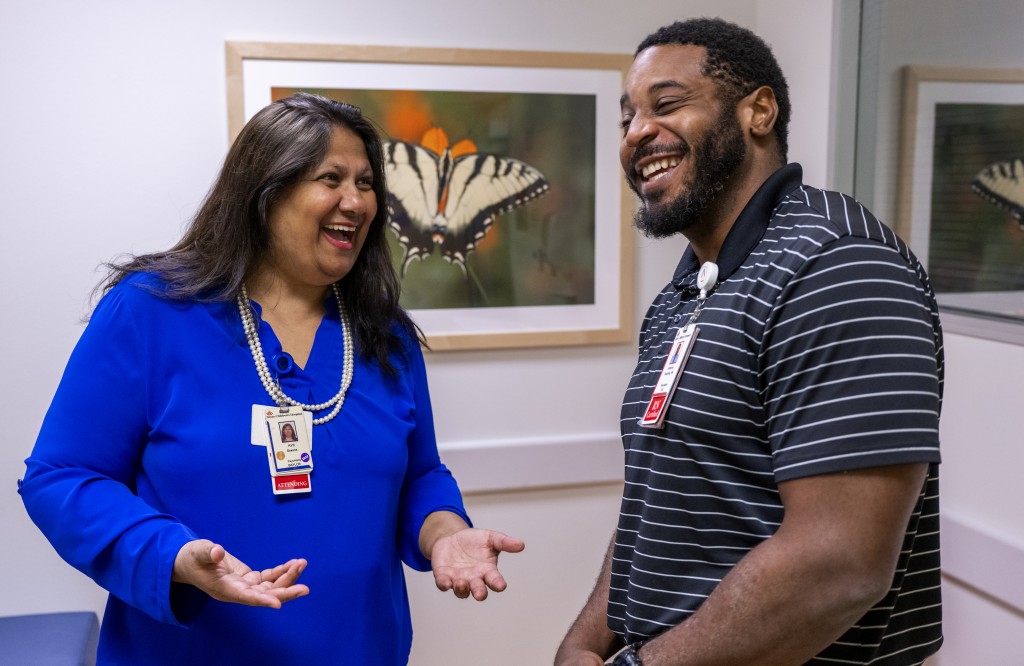Topics
When Dr. Karin Price and Dr. Kirti Saxena begin to talk about mental health, they lean in, light up and choose each word carefully. There can be no mistake about the importance of the topic. Within minutes of meeting both women, it becomes clear how they’ve reached positions of such stature and wide-ranging responsibilities.
Dr. Price, Chief of Psychology at Texas Children’s Hospital, and Dr. Saxena, Chief of Psychiatry, have led their departments since the Spring of 2020, during the heart of the COVID-19 pandemic. Their careers are rooted in their childhood experiences, reinforced by their natural abilities and refined by their mentors.
Who they are has become what they do.
Dr. Karin Price—Chief of Psychology
A humidifier mists in the corner of Dr. Price’s office, steaming out a relaxing scent and giving a clear command — take a breath and take care of yourself.
Her energy is an open book, made clear by an admission that she grew up in Brooklyn “before it was cool.”
The tale of Dr. Price’s childhood is not uncommon. Her mother and father were high school graduates with working class jobs, living in one of Brooklyn’s small neighborhoods. She was on track to lead a mainstream American life until one of her teachers intervened.
“Right before high school, I had a teacher who recognized my potential for math and science and encouraged me to apply to a specialized school in New York. It was a bus ride and three trains away from home; about an hour and 30 minutes one way,” Dr. Price recalls. “That experience changed my life.”
She sits up straight as if the memory requires her to pay attention in class. “Stuyvesant High School introduced me to a diversity of bright and driven young people. They expanded my way of thinking and how I viewed the world.”
Following high school graduation, Dr. Price attended The College of Human Ecology at Cornell University, and four years later she was a first-generation college graduate. She went on to complete post-graduate work at the University of Connecticut.
“I knew I wanted to do something to help children and my original thought was to become a child advocate attorney, but there were adults along my path who were placed there to ask me the right questions and guide me toward helping children’s mental health.”
Dr. Price, who is a wife and mother to two children of her own, enjoys the fact that life has come full circle. She now has the opportunity to intervene in children’s lives the way a teacher intervened in hers —helping them get healthier, and perhaps changing their course.
As head of the psychology department, which stands at 194 employees strong, Dr. Price has administrative responsibilities, provides patient care and conducts research. She specializes in the treatment of anxiety disorders, specifically selective mutism. Although she enjoys all of her roles, training psychology interns and fellows is among her favorites. She says it’s because her knowledge can be multiplied, thereby increasing the amount of children who can be helped.
Dr. Kirti Saxena — Chief of Psychiatry

Dr. Saxena was in motion for most of her childhood.
She spent a significant time away from her parents (both of whom were physicians), was reared by her paternal grandfather until the age of four, and at various points in her childhood she attended boarding schools in the United Kingdom and India.
But if she didn’t tell you, you wouldn’t know.
The Chief of Psychiatry has an aura that is grounded and stable, combined with an energy that radiates a sense of focus and peace.
This natural ability to ground people, connect with them and help them breathe easier is what blazed a path toward her destiny in mental and behavioral health care.

Dr. Saxena received her undergraduate degree from Jai Hind College in Mumbai, India. She went on to attend medical school at Albert Szent-Gyorgy University in Hungary, followed by general psychiatry and child psychiatry fellowship training at the University of Southern California and Stanford University.
She, much like Dr. Price, began leading the psychiatry department right before the pandemic, when the world provided the perfect recipe for our mental health to be challenged and strained.
“Mental and behavioral health are having a moment right now because of the effect these issues are having on society,” Dr. Saxena said. “The pandemic magnified a collective problem — there needs to be more focus and more awareness placed on our overall well-being.”
Dr. Saxena, who is a wife and mother to two teenagers, said she is pleased with the progress being made in the field — especially in regards to children.
In her role, she sees patients, conducts research, recruits faculty and trains those faculty members. She specializes in the evaluation and management of pediatric bipolar disorder, but her team of 45 professionals treats a variety of psychiatric illnesses, such as depression, anxiety and attention deficit disorder.
Her overall career goals are to provide evidence-based diagnostic assessments and treatment interventions for pediatric bipolar disorder. “I also continue to strive to develop wellness programs in schools and clinical settings through the practice of mind-body interventions.”
Collaborative Health Care
When it comes to treating mental health or behavioral health patients, it’s rarely a question of psychology or psychiatry — often both disciplines come together to develop the treatment plan.
“Dr. Price and I work together all of the time,” Dr. Saxena said. “We have to. Our collaboration is what yields the best results for our patients.”





